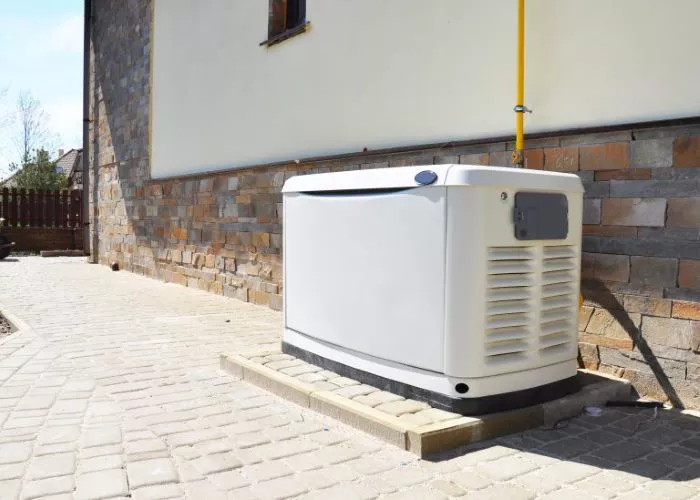When the power goes out, an emergency generator can keep your home running smoothly. Whether it’s a storm, grid failure, or natural disaster, having a reliable backup power source is essential. But with so many options available, how do you choose the best emergency generator for your home?
In this guide, we’ll break down everything you need to know—from different generator types to key features, fuel options, and safety tips. By the end, you’ll be able to pick the perfect generator for your needs.
Types of Home Emergency Generators
Not all generators are the same. The best choice depends on your power needs, budget, and how often you expect outages. Here are the three main types:
Portable Generators
Portable generators are the most common choice for homeowners. They run on gasoline, propane, or diesel and can power essential appliances like refrigerators, lights, and fans.
Pros:
- Affordable
- Easy to move and store
- Good for short-term outages
Cons:
- Must be manually started
- Limited power output (usually 3,000–8,500 watts)
- Requires fuel storage
Inverter Generators
Inverter generators are a quieter, more efficient version of portable generators. They produce clean, stable electricity, making them safe for sensitive electronics like laptops and TVs.
Pros:
- Fuel-efficient
- Quiet operation
- Safe for electronics
Cons:
- Higher cost than standard portable generators
- Lower power output (typically 1,000–4,500 watts)
Standby Generators
Standby generators are permanently installed outside your home and automatically turn on during a power outage. They connect directly to your home’s electrical system and run on natural gas or propane.
Pros:
- No manual starting required
- Can power an entire house (10,000–20,000 watts or more)
- Long runtime (as long as fuel is available)
Cons:
- Expensive upfront cost
- Requires professional installation
- Needs regular maintenance
Key Features to Consider When Buying a Generator
Choosing the right generator involves more than just picking a type. Here are the most important factors to consider:
Power Output (Wattage)
Generators are rated in watts (W) or kilowatts (kW). To determine the right size:
- Calculate your essential appliances’ wattage (e.g., fridge: 600W, lights: 100W, sump pump: 1,500W).
- Add a 20% buffer for startup surges (some appliances need extra power when starting).
General Guidelines
Small (1,000–3,500W): Powers a few essentials like lights and a fridge.
Medium (3,500–8,500W): Runs multiple appliances, including a window AC unit.
Large (8,500W+): Can power an entire home, including HVAC systems.
Runtime
How long can the generator run on a full tank? Portable models may last 8–12 hours, while standby generators can run for days if connected to a natural gas line.
Noise Level
Generators can be loud (60–80 dB). If noise is a concern, look for inverter generators (50–60 dB).
Transfer Switch Compatibility
A transfer switch safely connects your generator to your home’s electrical panel. Never plug a generator directly into a wall outlet (backfeeding), as it can be deadly for utility workers.
Top 5 Best Emergency Generators for Home Use
Based on power, reliability, and user reviews, here are five top picks:
Champion 7500-Watt Dual Fuel Generator
Type: Portable
Fuel: Gasoline or propane
Pros: Affordable, powerful, dual-fuel flexibility
Cons: Heavy (200+ lbs)
Honda EU2200i Inverter Generator
Type: Inverter
Fuel: Gasoline
Pros: Ultra-quiet, fuel-efficient, great for electronics
Cons: Lower wattage (best for small homes)
Generac GP15000E Portable Generator
Type: Portable
Fuel: Gasoline
Pros: High power (15,000W), electric start
Cons: Very heavy, expensive
Westinghouse WGen9500DF Dual Fuel Generator
Type: Portable
Fuel: Gasoline or propane
Pros: Remote start, long runtime
Cons: Bulky design
Kohler 20RESCL Standby Generator
Type: Standby
Fuel: Natural gas or propane
Pros: Whole-house power, automatic operation
Cons: High cost, needs professional installation
Generator Safety Tips
Generators can be dangerous if not used correctly. Follow these safety rules:
- Never run a generator indoors (carbon monoxide poisoning risk).
- Keep it dry (operate under a canopy, away from rain).
- Use heavy-duty extension cords (rated for outdoor use).
- Store fuel safely (away from heat sources).
- Install a carbon monoxide detector near sleeping areas.
Conclusion
The best emergency generator for your home depends on your power needs, budget, and how often outages occur. Portable generators are great for occasional use, while standby generators offer seamless, whole-house backup power.
Before buying, calculate your wattage needs, compare fuel options, and always prioritize safety. With the right generator, you’ll never have to worry about losing power again. By following this guide, you’ll be well-equipped to make an informed decision. Stay prepared and keep your home powered during emergencies!

